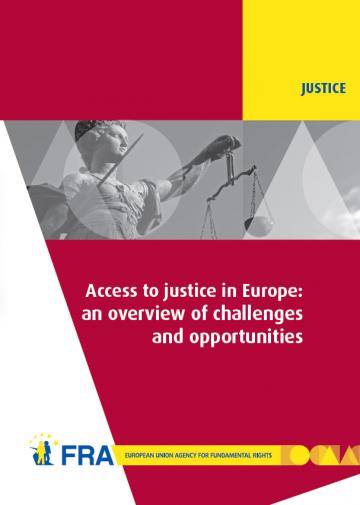FRA report reveals significant challenges to effective access to justice in the EU

Access to justice guaranteed by law, but not in practice
FRA Director Morten Kjaerum: "For rights to be made effective, victims need to be able to enforce them by having their cases decided by a court or other similar body. However, FRA research shows that in practice there are a number of barriers to this."
For example, 22 of the 27 EU Member States apply the rule that the losing side in a court case should pay the legal costs of the winning side. The risk of losing puts victims off bringing cases, even if they have a strong claim.
The report reveals several problems that result in victims being deterred or unable to enforce their rights by taking cases to court:
-
excessive length of proceedings appears to be the most frequent challenge across Member States;
-
high legal costs including lawyers' fees and court fees;
-
restrictive rules on who may take a case to court. This is often limited to the victim, rather than allowing other bodies to bring cases, such as non-governmental organisations, trade unions or national equality bodies;
-
a high degree of variation among Member States on the amounts of compensation awarded, which in some cases appear too low to act as a deterrent or fully compensate for the harm suffered.
The report also finds promising practices in some Member States, such as:
-
expedited procedures
-
insurance covering legal fees
-
legal advice centres or pro bono work offering victims free legal advice and representation
-
simple procedures where victims can represent themselves
-
alternatives to going to court to settle disputes, such as mediation or other non-judicial mechanisms
-
generous rules of legal standing allowing non-governmental organisations or other interested and specialised bodies to bring claims
Related FRA publications on this issue:
Find the full report here: Access to justice in Europe: an overview of challenges and opportunities
For more background information, see national thematic studies.
For further information please contact the FRA Media Team
E-mail: media@fra.europa.eu
Tel.: +43 158 030 642
Notes to editors:
-
The right of access to justice includes the right to a fair trial, the right to have one's case decided within a reasonable time, and the right to a remedy, such as compensation. This right is recognised by Articles 6 and 13 of the European Convention on Human Rights, Articles 2 and 14 of the International Covenant on Civil and Political Rights, and Article 47 of the EU Charter of Fundamental Rights.
-
The European Union Agency for Fundamental Rights (FRA) is mandated to provide evidence-based advice to decision-makers in the EU. The Agency's evidence aims to inform EU and national policy makers and to contextualise debates on fundamental rights in the European Union.